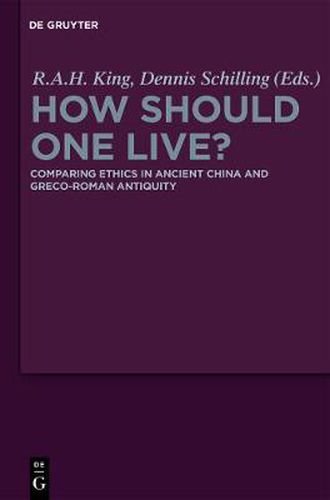Readings Newsletter
Become a Readings Member to make your shopping experience even easier.
Sign in or sign up for free!
You’re not far away from qualifying for FREE standard shipping within Australia
You’ve qualified for FREE standard shipping within Australia
The cart is loading…






This title is printed to order. This book may have been self-published. If so, we cannot guarantee the quality of the content. In the main most books will have gone through the editing process however some may not. We therefore suggest that you be aware of this before ordering this book. If in doubt check either the author or publisher’s details as we are unable to accept any returns unless they are faulty. Please contact us if you have any questions.
Chinese and Greco-Roman ethics present highly articulate views on how one should live; both of these traditions remain influential in modern philosophy. The question arises how these traditions can be compared with one another. Comparative ethics is a relatively young discipline, and this volume is a major contribution to the field. Fundamental questions about the nature of comparing ethics are treated in two introductory chapters, followed by chapters on core issues in each of the traditions : harmony, virtue, friendship, knowledge, the relation of ethics to morality, relativism. The volume closes with a number of comparative studies on emotions, being and unity, simplicity and complexity, and prediction.
$9.00 standard shipping within Australia
FREE standard shipping within Australia for orders over $100.00
Express & International shipping calculated at checkout
This title is printed to order. This book may have been self-published. If so, we cannot guarantee the quality of the content. In the main most books will have gone through the editing process however some may not. We therefore suggest that you be aware of this before ordering this book. If in doubt check either the author or publisher’s details as we are unable to accept any returns unless they are faulty. Please contact us if you have any questions.
Chinese and Greco-Roman ethics present highly articulate views on how one should live; both of these traditions remain influential in modern philosophy. The question arises how these traditions can be compared with one another. Comparative ethics is a relatively young discipline, and this volume is a major contribution to the field. Fundamental questions about the nature of comparing ethics are treated in two introductory chapters, followed by chapters on core issues in each of the traditions : harmony, virtue, friendship, knowledge, the relation of ethics to morality, relativism. The volume closes with a number of comparative studies on emotions, being and unity, simplicity and complexity, and prediction.